Το πρόβλημα του κακού στο Φίλωνα τον Αλεξανδρέα με ειδική αναφορά στο Περί προνοίας
Ενότητα:
Άρθρα του περιοδικού "Φιλοσοφία"
Χρονολογία έκδοσης περιοδικού
1975-1976
Περισσότερα...
Τύπος
Επετηρίδα
Συγγραφέας
Δραγώνα - Μονάχου , Μυρτώ
Περισσότερα...
Τίτλος άρθρου/ανακοίνωσης
Το πρόβλημα του κακού στο Φίλωνα τον Αλεξανδρέα με ειδική αναφορά στο Περί προνοίας
Γλώσσα: Ελληνικά, Νέα (1453-)
Θεματική ενότητα άρθρου/ανακοίνωσης
Ιστορία της Φιλοσοφίας
Γλώσσα άρθρου
Ελληνικά - Νέα (1453-)
Αγγλικά
Περίληψη άρθρου
It has been argued, especially by P. Barth, that Philo’s theodicy is either a continuation or modification or lastly a true repetition of Stoic theodicy. The author of this paper believes that this is only partly true in the De providentia and with regard to natural evil, but not in Philo’s work as a whole or with respect to metaphysical and moral evil. More specifically, through a quick survey of Philo’s theological (exegetic) work and after a thorough investigation into and analysis of the De providential, the author reached the following conclusions regarding the character of Philo’s theodicy and his debts to his philosophical predecessors, which somewhat modify some generally accepted view. From the De opificio mundi and some other exegetical treatises it appears that Philo is closer to Plato and the Pythagoreans than to the Stoics in considering metaphysical evil as due to the imperfection inherent in the status of the creatures and perhaps to matter and its resistance to the divine purposes, and in attributing moral evil to human freedom and, allegorically speaking, to «divine powers» and Logos but not to the «first God» Himself. The question of divine intervention being complicated in Philo, divine transcendence provided him with a solution to the problem of metaphysical evil of which Stoic monism and pantheism could not avail themselves. A similar position concerning metaphysical and moral evil is taken even the De providentia. Regarding natural evil (physical disasters, pain, unjust suffering) Philo is actually close to the Stoic attitudes especially from the methodological point of view. His stand particularly in the De providentia closely echoes the opinions ascribed by other authorities to the Stoics, and some passages of this work should have been placed by Arnim among the Stoic fragments, e.g. II 99 in SVF 2, 1170 AND 1176, I 47 in 2, 1171, II 103 in 2, 1173, I 54 in 2, 1174, II 105-109 in 2, 1175 and 1176, II 102 in 2, 1177 and II 104 in 2, 1181 and 3, 567-581. The similarities of Philo’s views with Seneca’s De providentia as concerns natural evil are more striking and he anticipates some orthodox thoughts of Epictetuts’ on the wise man’s independence of external factors, self-sufficiency and sense of inward freedom. Most of these attitudes, however, are not alien to Plato, and, as is clear from some passages in the De providentia, Philo did not intend to write a philosophical treatise with a specifically Stoic character. He was eclectic in his theodicy as in so many other aspects of his philosophical theology, though the arguments for the providential care of the world found in the De providentia fully correspond to Balbus’ arguments for the existence of providence in Cicero’s De natura deorum, perhaps because the Stoics were the first philosophers who treated the defence of the providential administration of the world systematically. The author of this article disagrees also with the current (cf. especially Wendland’s) view of Posidonius as Philo’s main source in the De providentia, since, apart from some explanations of certain natural phenomena, there is nothing in the work which could be seen as specifically Posidonian. She agrees to some extent with Boyancé’s approximation of Philo to Antiochus. She also does not believe – as do most who have written on Philo – that Philo’s attack on astrology was directed against orthodox Stoicism. Philo in his exegetical work constantly attacked the astrological determinism of the Chaldeans, so widespread in his age. The Stoics, though admitting determinism, did not reject the belief in gods and their providence nor did they attribute moral evil to fate, not even Posidonius, who was called magnus astrologus. If Philo’s attack did not have the Chaldeans as its target – since it has a personal character – this paper brings forward some working hypotheses concerning the identification of the determinist whom Philo was particularly addressing. It might be either the emperor Tiberius, or Manilius, or the unknown astrologer who wrote under the fictitious name Nechepso-Petosiris, or, more likely, the Egyptian Stoic Cheremon, the allegorical interpreter of the Egyptian religion and the defender of the crude Egyptian zoolatry, through whom, according to Daniéloy, Philo came to know Stoicism. Philo’s theodicy, for all its debts to Platonic, Stoic an, of course, Judaic theses, has also a personal character, which renders it not only historically but even philosophically important.
Λέξεις -κλειδιά
Φίλωνας ο Αλεξανδρέας
Κακό
Πρόνοια
Creative Commons
Αναφορά Δημιουργού - Μη Εμπορική Χρήση - Παρόμοια Διανομή 4.0 Διεθνές - CC BY-NC-SA

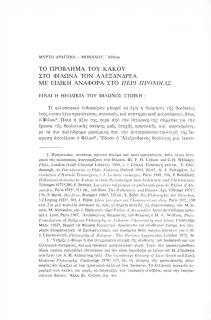
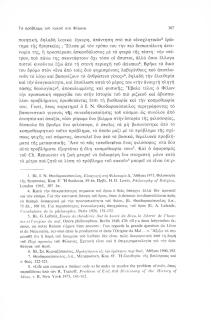
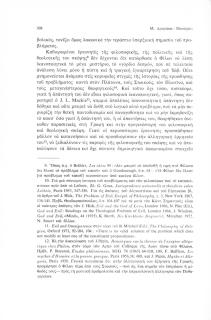
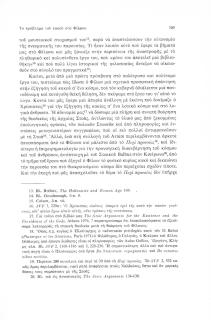
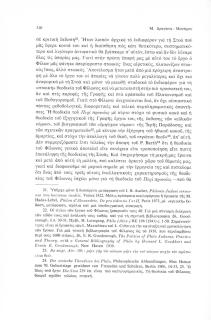
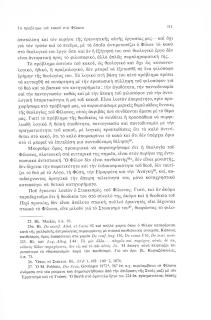
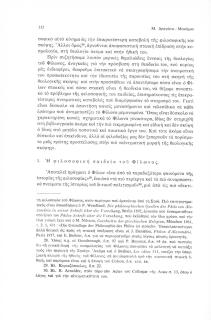
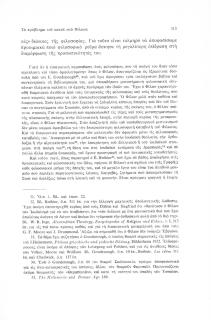
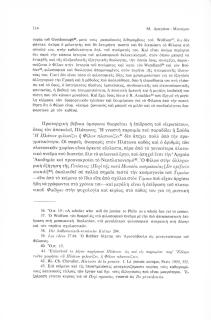
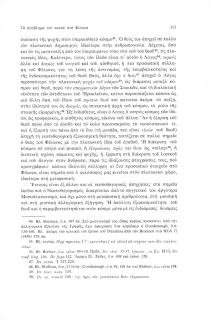
 Look inside pdf
Look inside pdf